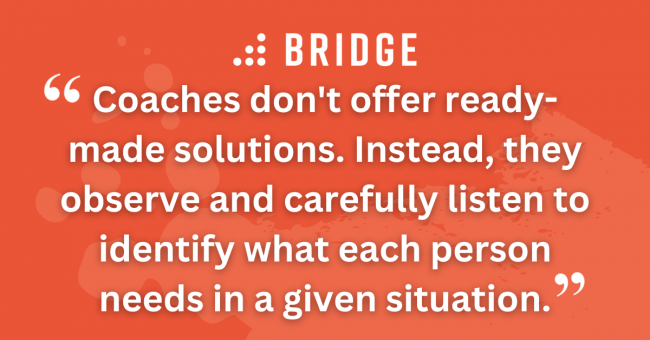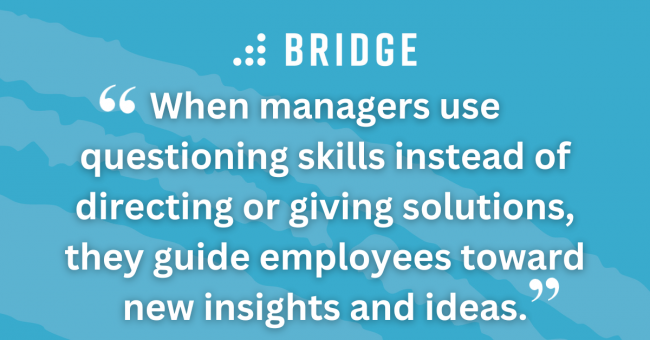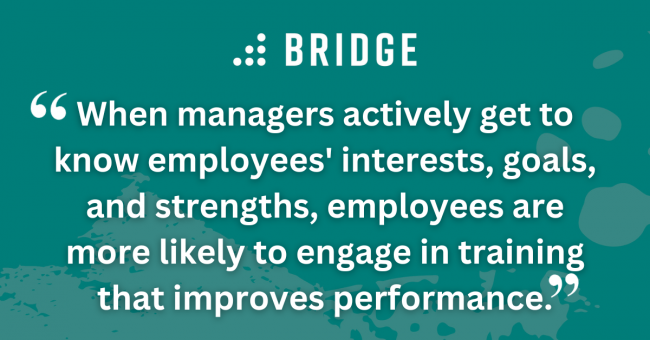Your managers play a critical role in developing employees. According to a report compiled by the World Economic Forum, four in five leaders expect to invest heavily in on-the-job training to combat skills gaps and talent shortages, and they see managers as key partners in these L&D initiatives.
Keep reading to discover how to unleash your managers’ full potential by equipping them with coaching capabilities.

Five Must-Have Coaching Skills for People Managers
Here are five coaching skills all great managers should add to their toolkits.
1) Actively Listening
Coaches don't offer ready-made solutions. Instead, they observe and carefully listen to identify what each person needs in a given situation. An engaged and purposeful form of listening means being attentive by responding, reflecting, and summarizing information.
It's important to focus on the broader context of the conversation, and coaches need to tune into a situation based on factors such as tone of voice and body language.
Some ways managers can practice active listening during discussions include:
- Eliminating distractions
- Looking for nonverbal cues
- Requesting clarification using questions/statements such as:
- “After listening to you, my takeaway is that…”
- “Am I right in thinking that…”
- “If I understand what you’re saying, you’re feeling overwhelmed. Would that be correct?”

2) Asking Meaningful Questions
Coaching isn't about having all the answers, and asking powerful and thought-provoking questions encourages creative and solution-focused thinking.
When managers use questioning skills instead of directing or giving solutions, they guide employees toward new insights and ideas.
Some examples of effective questioning tactics include:
- Asking questions that avoid yes/no responses
- Avoiding questions that might lead to a conclusion
- Refraining from making assumptions
- Keeping questions specific to the topic
3) Giving Feedback
Continuous feedback guides employees with relevant and actionable steps. Although feedback should be regularly exchanged at all levels of the organization, research conducted by Gallup suggests that employees find recognition most meaningful when it comes from a manager or leader.
Feedback should be ongoing, and always timely and specific. When managers provide examples of the behavior and connect it to strategic goals, it helps people see the impact and growth over time.
Access to real-time learning data equips managers with the information they need to deliver helpful and targeted feedback to their teams based on relevant information.
Executive coach Bridgette Boudreau highlights the importance of adopting a coaching approach to delivering and receiving feedback. Clear and direct feedback helps your people understand the goal and how to achieve it:
We need to install feedback loops, and this is where coaching comes in because people have to get over conflict avoidance. I train people in the principles of being direct and kind in their feedback. Feedback should be given in the moment as much as possible, and not just to correct behavior. It’s important to catch people doing it right and give them specific feedback, not just a general shout-out. We’ve overengineered the feedback process, but it can be much simpler. Your coaching approach should, whenever possible, be simple, direct, kind, specific, and in the moment.
Bridgette Boudreau
KEEP READING | ‘Continuous Feedback: The Key to the Best Performance Reviews’

4) Recognizing Employees’ Strengths
A study of coaching practices among managers and employees emphasizes the importance of relationship-building. When managers actively get to know employees' interests, goals, and strengths, their reports are more likely to engage in training and upskilling.
A strengths-based approach requires managers to regularly discuss and review personal and professional goals and career aspirations with each team member. With this information, they can assign tasks that best utilize their people's strengths and work toward a set of meaningful goals.
The following approaches can help managers unlock and utilize employee strengths:
- Using personality tests to uncover your people’s strengths and weaknesses
- Engaging in frequent career discussions to understand what drives your people
- Connecting professional goals to personal aspirations
HELP YOUR MANAGERS START DEEPER DISCUSSIONS | ‘Discover What Drives Your Employees in Their Careers’
5) Setting Actionable Goals
Managers should support their people in defining objectives, identifying tasks, and setting timelines based on the skills they need to learn to achieve their objectives. By setting and tracking clear, specific, and attainable goals, coaches support employees in their growth and keep them accountable.
In addition, goals support employees in their day-to-day performance, bring clarity to their work, and help them prioritize tasks. Through frequent check-ins and conversations, managers and their reports can review progress and achievements together and explore solutions to overcome challenges.
MORE WAYS TO PARTNER WITH PEOPLE MANAGERS | ‘4 HR Strategies for Manager Enablement’
Empower Your Managers as Coaches
Download the ebook 'How to Empower Managers to Be Coaches' and learn how to build a coaching culture.




